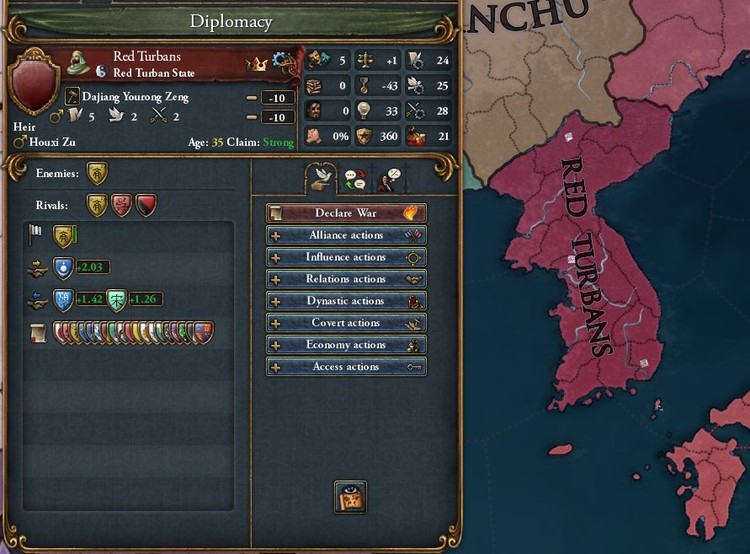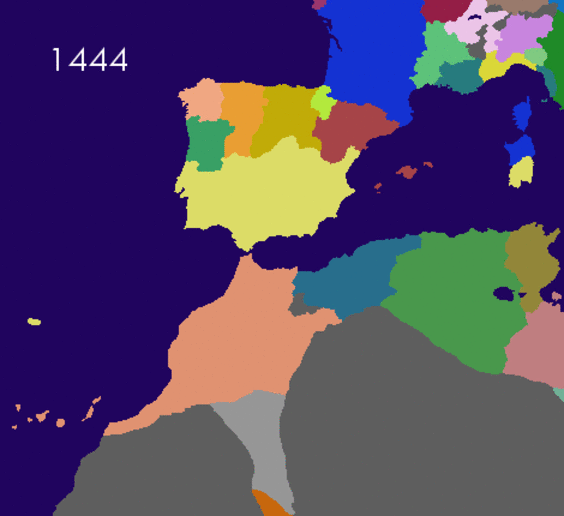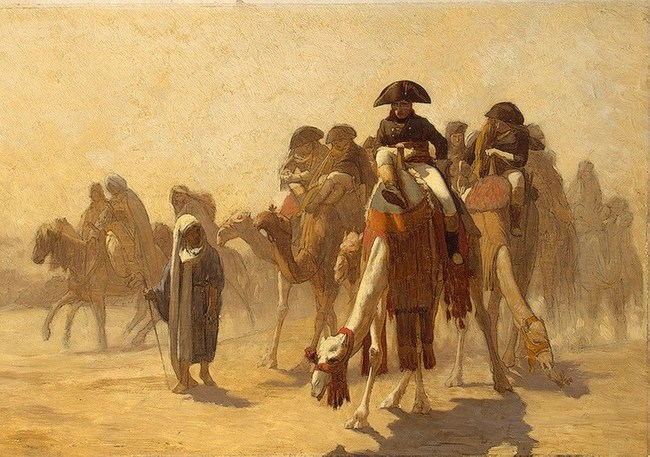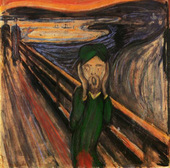|
Dev-wise its probably about the same
|
|
|
|

|
| # ? May 29, 2024 06:55 |
|
All things considered we're not in a particularly terrible spot as despite all the land we don't have we do own most of the Iberian land that actually matters. Problem is we're kind of at the mercy of what Tirruni/France and all the other big boys do.
|
|
|
|
I'm just happy that in some timeline the celts fixed that difficulties French Cornwall
|
|
|
|
Flappy Bert posted:I'm just happy that in some timeline the celts fixed that difficulties French Cornwall yeah that's what jumps out to me the most, what the gently caress is up with the celts here
|
|
|
|
Rodyle posted:yeah that's what jumps out to me the most, what the gently caress is up with the celts here they were allies with us at one point, thus dooming them. notice how bavaria got rocked the moment the ink on our treaty was signed.
|
|
|
|
Hashim posted:Hannover never actually fought Tirruni, they were pretty weak throughout EU4, and are only as strong as they are now thanks to the land granted to them in the Peace of Krakow. France on the other hand would normally be at least as strong as the Tirruni Empire, even with all of southern France stripped away from them, but I massively cut their manpower and army numbers to represent the fact that they spent the past 10 years under constant occupation from Tirruni, the Mahdiyyah, Morocco and Qadis. Still, maybe I was a bit too harsh on them, I might boost their manpower a bit more. France should remain man power constrained they lost 1 million plus soldiers in the last 40 years going of your screen shots. On top of all their lands being pillaged, burned etc. Wikipedia has the population of France in 1800 at 30 million, these wars would be a demographic disaster for a France that lost its southern half.
|
|
|
|
Yeah, the sheer amount of western european hellwars that we've had so far should really have some major geopolitical consequences, but EU4 doesn't really model demographics, so what can you do?
|
|
|
|
Cerebral Bore posted:Yeah, the sheer amount of western european hellwars that we've had so far should really have some major geopolitical consequences, but EU4 doesn't really model demographics, so what can you do?
|
|
|
I ran the first observer game for MotE today, and this was too good not to share... The Majlis finally have control of the Straits!
|
|
|
|
|
Make it canon Please
|
|
|
|
It's beautiful Why must you hurt us so, Hashim?
|
|
|
|
Lord Cyrahzax posted:It's beautiful It's border gore
|
|
|
|
Why do you tease us like this, Hashim?
|
|
|
I just thought I'd show you all something that's never gonna happen in the LP  Cos you just know that everything's gonna go against the Majlis once I start actually playing Cos you just know that everything's gonna go against the Majlis once I start actually playingJeoh posted:It's border gore Yeah, that's a very unfortunate side effect of MotE, you're almost always guaranteed bordergore after any war. That's why I'm not gonna be treating any conquered territories (by any country) in the MotE portion of the LP as permanent, instead we'll figure out how to divy up the territories lost or gained in our own Congress of Vienna (if the monarchists win) once we hit 1836, or a sort of Revolutionary Congress if Tirruni wins.
|
|
|
|
|
I just noticed something, is it intentional that the Latin Empire only has northern hungary in MoTE?
|
|
|
unwantedplatypus posted:I just noticed something, is it intentional that the Latin Empire only has northern hungary in MoTE? The Latin Empire have been all over the place for most of eu4, I don't even remember when they got as far north as Hungary, but by 1821 Serbia/Armenia conquered most of their holdings in Thrace, Macedonia and Greece, so all they're left with are parts of Epirus and a sliver of land in northern Hungary.
|
|
|
|
|
Agean90 posted:they were allies with us at one point, thus dooming them. notice how bavaria got rocked the moment the ink on our treaty was signed. I meant in that Observer game
|
|
|
|
Hashim posted:I ran the first observer game for MotE today, and this was too good not to share... That's not worth what happened to Madhiyyah and you know it.
|
|
|
|
AJ_Impy posted:That's not worth what happened to Madhiyyah and you know it. Agreed, Tirruni really should clean up that bordergore.
|
|
|
|
Chapter 32 - Epilogue - World of 1821 The world of 1821 is one that is radically different from that of 400 years ago, with once-dominant empires now steeped in decline or lost to memory, young and powerful nation-states on the rise all across the world, and the forces of conservatism and liberalism embroiled in constant conflict. And the epitome of all this chaos has to be Iberia. Led by the Jizrunid dynasty, the entire peninsula was united under the Sultanate of Al Andalus in the mid-1600s, and with a vast colonial empire in Gharbia also under their control, Muslim Iberia enjoyed uncontested supremacy as the world’s leading power for almost half a century. That, obviously, wasn’t to last.  For almost a century, Al Andalus was rocked by a series of revolts and rebellions, ranging from separatist riots to religious insurgents. What finally proved to be the undoing of Al Andalus, however, was the Majlisi Revolution of 1760, where the Majlis al-Shura raised an army in opposition to the Mad Hunchback. What followed was would later be called the Third Taifa period of Iberia, as Al Andalus fractured into a handful of feuding states. Dominated by the noble class, the Majlis quickly acted to secure Qadis and its environs, before pushing out to capture the rest of southern Andalusia and Portugal. Thus, by 1821, it stands as one of the last dominant powers in Iberia. And under the new commander of the army and Grand Vizier of the Majlis, Raed al-Zulfiqar, it is determined to defeat its rival and complete the reunification of al-Andalus.  That would prove to be no easy task, however. First arising as a religious revolt in the holy city of Qurtubah under the so-called Mahdi, the Mahdiyyah has quickly subjugated large parts of Iberia and southern France, strengthened by their alliance with Morocco. Much of the politics of Qurtubah remains a mystery to outsiders, however, though many have gathered that the original Mahdi has been dead for many years now. The Mahdiyyah has been led by a string of his closest companions since then, all of whom seem to have taken up the title of Mahdi Muhammad upon their succession, only further confusing the matter to outsiders.  And since the theocratic regime came about, there has also been a definite shift in the demographics of the peninsula, with large tracts of northern and western Iberia forcibly converted to Sunni Islam, along with the many minority faiths and heresies that once existed.   . .Note: this is the demographics of all of Iberia, not just Qadis' territories. The most successful of the Andalusi successor states, however, has to be the Tirruni Empire. Initially seeing modest successes under the independent Emirate of Qattalun, the outbreak of revolution in Corsica quickly spread to the mainland, with Sahim Tirruni emerging as the leader and commander of radical forces. The ruling elite were quickly forced into exile in Morocco, with the revolutionaries capturing vast tracts of Catalonia and Occitania over the next few months. And from there, decisive victories against both France and Provence saw the revolutionary regime rise to become a great power in Europe. Tirruni has since declared himself Sultan of Sultans and Emperor of Europe, but with a new coalition quickly forming against his regime, these grandiose claims will soon be tested.   Further north, meanwhile, the scene is dominated by France and the Celtic Empire. Both are old powers who’s best days are behind them, but a new conflict is brewing over the matter of England, with both determined to be recognised as the sole and undisputed King of England.  The past century has been particularly disastrous for the French, who lost huge swathes of land to Tirruni’s Revolutionaries and the Mahdiyyah’s fanatic soldiers, with the lost of southern France only slightly compensated for by their new vassal in the Rhine Confederacy. And despite the huge manpower losses suffered in recent wars, the Queen-Regent now looks to reclaiming Aquitaine and Occitania, hoping to gain German and Russian backing for her daughter’s claims. The Celts, meanwhile, are similarly embroiled in constant warfare. Still led by the ó Kildare dynasty of the Early Middle Ages, the Celtic Empire struggles to maintain primacy in Britain even as they fight independence wars in the new world, hopelessly trying to hold on to their colonies whilst also repelling French incursions.   Central Europe, on the other hand, has seen its borders arbitrarily redrawn by the tenuous Peace of Kraków. The terms of the congress has seen the once-vast Bavarian Republic carved between the victorious powers, with France achieving their long sought-after supremacy over the Rhine in the west, and Smolensk gaining Brandenburg and Poland as vassals in the east.  Germany is dominated by two rivalled powers: the small and weakened Duchy of Bavaria in the south, and the young and fierce Kingdom of Hannover in the north. The restored Goði dynasty rule over an unruly liberal population, and are likely going to face numerous revolts in the near future to reinstate the Republic. The von Wettins of Hannover, on the other hand, are already the overlord of a number of smaller states, unifying large parts of north Germany under their rule. Their ambitions are far loftier than just that, however, and if they manage to secure concessions from Bavaria, then all of Germany stands open to Hannover.   Further east, meanwhile, an altogether more titanic struggle is on the verge of breaking out. The two Russian powerhouses of Smolensk and Novgorod have rapidly expanded over the past few centuries, absorbing large parts of Scandinavia and eastern Europe into their vast domains, but both now look to declare themselves the Emperors of All Russia - and that can only be decided through war.  Smolensk is still led by the Rurikid dynasty, once monarchs of the vast Kievan Empire in the Middle Ages, and as such still lay claim to Novgorod and Moscow. With the Third Coalition War on the verge of breaking out in the west, however, they will be forced between joining the intervention against Tirruni or focusing their efforts on the War of Russian Leadership. Novgorod, meanwhile, has seen its fortune rise under the widely-celebrated Roman dynasty. In Russia proper, however, many have begun to see the Tsars as Scandinavian monarchs - after all, they dress like Swedes, eat like Swedes, they even look like Swedes - so how could they claim to be Emperors of All Russia?   To their south, the Balkan peninsula is dominated by the Serbian Republic, a revolutionary regime that has seen unparalleled successes over the past few years. Just as the Serbs looked to conquer Constantinople, however, revolts broke out all across the empire, determined to overthrow the oppressive and tyrannical rule of the revolutionaries.   The Middle East, on the other hand, has seen its borders change several times throughout the past few centuries. Out of the many emirates and sheikhdoms dotting the region in the 1400s, however, only three feuding powers have emerged: the Vakhtani Caliphate, the Vali Emirate, and the Crusader State of Egypt.  The Armenians dominated the Near East for much of the Pre-Modern Era, with the caliphate at its height stretching as far west as Greece, north to Crimea and south to the Sinai peninsula, before a string of weak caliphs began its decline. Recent losses on the battlefield has seen the Armenian Caliphate surrender large parts of the Levant to Crusader Egypt, who are now on the verge of pouring into Anatolia. Once steadfast allies of the Vakhtangians, the Vali Emirate have managed to seize a few victories of their own by abandoning the Caliph and allying with Egypt. Thus, upon the conclusion of the Syrian Wars, the Kurdish dynasty managed to bring the entirety of Mesopotamia under their control, with their influence even pushing into traditional Persian lands.   And just off the edge of Anatolia, the Sultanate of Rhodes has managed to maintain its unbroken independence for the past four centuries, playing the different mainland empires off each other to ensure its survival. To add to that, the same Hassanid dynasty has ruled it for the entirety of its existence, though they converted to Shia Islam in the late 1400s.  Not far from Rhodes, the recent history of Greece has been disastrous, to say the least. As though losing western Anatolia to the Armenians and having Crete snatched away by the Moroccans weren’t enough, the past century saw the territory of Greece shrink to the Peloponnese, forced to swear vassalage to Cherson just to maintain their independence.  And finally, moving to the Crusader State of Egypt, a title that has lost all meaning as it is now known as simply Egypt. Despite ruling over a vast Muslim population, the Apanoub kings have managed to carry out a series of tolerance and modernisation reforms, determined to bring their kingdom on par with European powers. And though they still can’t match the stronger Western powers, these reforms enabled the Egyptians to not only defeat their Armenian rivals in the Syrian Wars, but also conquer the Sudan to the south. The Apanoub now look to control the rest of the Nile, which can only be achieved through war with the Ethiopian Empire, a relatively backwards state they shouldn’t have much trouble defeating.   Further east, meanwhile, Persia has come to be dominated by the Khwarezmian Empire. The Persian Empire had actually controlled large parts of Iran and Iraq centuries ago, but a string of internal revolts and foreign attacks saw the fall of the Persian ruling class, with an invasion of Khwarezmian Turks driving them out and declaring themselves Shahs of Khwarezm and Iran. The following centuries were relatively bountiful, with the peace only interrupted by occasional wars with Kurds or Afghani tribesmen, though the Khwarezmian have fallen behind their western neighbours both in technology and population.   Borne out of a Sunni holy order of Ghazis which initially conquered Afghanistan during the 1300s, the Ghazi State has since transitioned into a monarchy under the local Taraki dynasty, overthrowing the religious elite in a bloody rebellion of tribesmen. Still heavily feudalistic and militarily backwards, the Taraki have looked to revitalise their declining shahdom by launching an invasion of Multan, quickly drawing protests from the Moroccan viceroy in the south.  And in the south, the chaos and divisiveness of Arabia has been dispelled by the rise of the Sharifian Khilafa, the Shia caliphate proclaimed by the Sharif of Mecca. Ruling from his capital in Jeddah, the Sharif managed to carry out a series of invasions into the interior of the peninsula, cleverly using internal rivalries to subjugate the constantly-feuding tribes and clans, before attacking and defeating both the Vali Emirate and Khwarezmian Empire. Having created the largest Arabian empire in a millennium, the Sharifian Caliph has vowed to push northward and conquer the Shia-dominated Mesopotamia, as well as reclaim Egypt from the Christians - a venture doomed to end in failure.   And just off the coast of Africa is Suqutra, another island-nation to survive since 1444. Unlike Rhodes, however, the Ibadi population of Suqutra overthrew the ruling Shia dynasty a long time ago, with a republican government taking root in the island instead.  Even further south, the horn of Africa has come to be dominated by the Ethiopian Empire, though its influence has been suffering with the disastrous invasions of Crusader Egypt. Having already surrendered Eritrea to the Egyptians, the Ethiopian ruling dynasty is facing its darkest years yet, unable to effectively modernise in time to push back the invaders.  Across the width of the Sahara, meanwhile, the vast empires of West Africa have also stagnated and declined in recent years. With the sole exception of Benin, a regional power ruled by a Pagan dynasty, all other African empires have fallen far behind in technology, forced to cede vast tracts of their coast to the Moroccan Empire. Almoravid influence now stretches as far south as Timbuktu, and the Berbers are determined to build on that, greedily looking to gold-rich cities of the Malian Empire.   And finally, to the immediate north, Almoravid Morocco stands strong as the world’s leading power. Boasting the largest navy by far, along with a respectable-enough army, the Moroccan Empire stretches from Gharbia in the west to Indonesia in the east, with its vast territories in the new world and the Indian peninsula turning it into the largest and richest of the great powers. Berber influence at home, however, has begun to decline with the rise of Tirruni in the north. Staunchly opposed to the revolutionary ideals espoused by Tirruni, the Almoravid Sultan Yahya is determined to see the downfall of his rival to the north, and the restoration of monarchy in Qattalun and Occitania.   And the first battleground of this conflict is Palermo, a relatively small and weak emirate stretching across Sicily and southern Italy, ruled by the Jizrunid dynasty since the Middle Ages. Despite sending several envoys to try and entice the monarch into a pact, Tirruni was left infuriated when the traditionalist Emir Ibrahim-Yah opted for an alliance with Morocco instead.   War between Almoravid Morocco and the Tirruni Empire is on the horizon, of that much there is no doubt. With North Africa sparsely populated for the most part, however, the Sultan will have to look to their colonial empire for soldiers - especially India, the jewel in the crown of the Almoravid Empire. Berber ships first docked at Indian ports in the early 1500s, and a series of wars since then has seen Almoravid possessions rapidly expand, until all of the south and large tracts of central India was under their dominion.  And the Almoravids aren’t satisfied yet, with the Sultan determined to do what no one else has done, and unite the entirety of India under his rule. The only hope for repelling these invasions is the Cedi Empire, a Hindu power ruling over Orissa and Bengal. Recent years have seen the Cedi become decadent and corrupt, however, and unless extreme modernisation reforms are undertaken very soon, they won’t be able to put up much of a fight.  And finally, reaching the eastern tip of the Almoravid Empire, the Berbers have managed to subjugate large parts of Indonesia and Australia. Except for a few French and Celtic ports here and there, Almoravid influence over the region is largely uncontested, threatening to complete their conquest of the East Indies with almost no opposition.  The only power in the area that the Moroccans actively support, in fact, is the Sulu Sultanate. In a tale that has already been published all across Europe, a Moroccan prince named Muizz-ul-Din was leading the Berber Navy on an exploration mission when he came across the shores of Sulu, upon which he fell in love with a local woman and vowed to never leave again. The Almoravid Sultan granted the island to his son as a wedding gift, and Muizz’s descendants rule it to this day, vassals to the Sultan in Marrakesh in all but name.  To the north, the lands of China stand as divided and chaotic as ever. The south has come to be dominated by a number of constantly-feuding dynasties, but a series of foreign invasions in the north has seen it largely come under the control of the Mongol Empire, claiming to be the successor of Genghis Khan’s empire and a royal dynasty in its own right.   The Mongols’ complete domination of China is threatened by only one other power: Japan. A self-proclaimed republic since the Revolution overthrew the Manchu ruling class, the Japanese have managed to conquer the entirety of Manchuria, hoping to use it as the launching pad for further invasions into the fractured and constantly-warring Dynastic China.   And stuck between these two rising powers is Korea, ruled by an elite class of Manichean monks, called the Red Turbans for the blood-red hair coverings worn by their soldiers. Initially hailing from China, the Red Turbans launched an invasion of Korea when their initial lands were first conquered by the mighty Feng dynasty, quickly barricading the peninsula against further invasions once conquered. The state has been staunchly isolationist since then, interrupted only by a brief conquest of parts of Manchuria, before suffering a humiliating defeat to the Japanese revolutionaries late in the 1700s. Red Turban Korea is now one of the many battlegrounds between the Mongols and the Japanese, with the two rivals grappling for influence in the peninsula.  Across the vast Pacific Ocean, meanwhile, the continents of Gharbia are similarly embroiled in revolution. With the exception of native empires, the entirety of southern Gharbia is still controlled by colonial powers, though independence revolutions have already broken out in New France and New Occitania, and are sure to spread to Almoravid possessions before long.  Speaking of the natives, both have seen their vast empires shrink over the past few years, having suffered humiliating losses in countless foreign invasions. With their legitimacy challenged, huge revolts broke out all across the Andes, with the Incan ruling class overthrown, gruesomely executed and replaced with a revolutionary government. And once a president was elected, the Inca embarked on their first offensive war in centuries, attacking Charca with the intention of unifying the remaining native powers into a single republican empire.   To the north, the rich and densely-populated Caribbean islands are also dominated by Morocco, though the Sultan has granted his colonies here a large degree of autonomy. Taghzir is bordered by Al-Qarbiya to the east and the Hishami Sultanate to the west, both Andalusi successor states that have allied with one another.    And finally, we reached the heartland of the Revolution in the new world. Bearing the largest empire in Gharbia, and one of the great powers of the world, Ibriz ranges from Panama City in the south to the Great Plains in the north, a republic with ambitions that stretch from sea to sea. Colonialism is on steep decline here, with the Celtic colonies already embroiled in a war for independence, one they’re very likely to win.  The two states dominating the north are, predictably, Ibriz and New England. Still ruled by the Butler dynasty, who were invited to directly rule their colonies when England was destroyed centuries past, the New English are determined to extend their control inland and repel Ibrizi influence in the north. And as the revolutionaries consolidate their rule in Ibriz and the Butler Queen dispatches emissaries to the Celtic colonies, the next century is sure to be dominated by the struggle between the rivalled powers.   A temporary lull seems to have taken hold, but tensions are on the rise and rivalries are on the verge of breaking out into open warfare. With the forces of revolution and reaction preparing to clash all across the world, from Gharbia in the west to China in the east, the only question on anyone’s lips is who’s going to strike first? Extra Information World map in 1821, after border adjustments:  World map in 1821, before border adjustments:  Religious map in 1821:   There’s definitely going to be some changes here, so don’t take it as gospel. Culture map in 1821:  Devastation/prosperity map in 1821:  Development map in 1821:  Largest population (combined province development) in the world:  Largest cities in the world:  Largest income in the world:  Great powers of the world:  Iberia timelapse:  ——— The new Grand Vizier of the Majlis al-Shura, Raed al-Zulfiqar, remains relatively unknown and mysterious to the greater public. With a tight grasp over the Majlis and the army, however, it isn’t long before he settles into his newfound power and authority. Contemporary spectators tell us that the commander worked day and night as he reformed the army corps, drew up extensive invasion plans, inspected his troops and drilled his elite soldiers. War was on the horizon, that much was certain, and Raed was determined to meet it head-on. In the very last days of 1820, however, Raed broke with his usual routines and attended a play in the celebrated theatre circuits of Qadis - heading straight for a new act called the Chronicles of Al Andalus. Years in the making and not yet open to the general audience, the Chronicles of Al Andalus was a tragedy that would depict the rise and fall of the Jizrunid dynasty, a dangerous topic in the current political climate. And for the next four hours, Raed scarcely moved as he watched history play out before his eyes. Spanning everything from the murky origins of the Jizrunids to their decline and overthrow less than fifty years ago, the Grand Vizier of Qadis watched the tall and strong Sultan Abdul-Hasan crush Christian caricatures before falling prey to senility, he watched Hafid the Great feud with meddling Frenchmen before uniting all of Iberia under one flag, he watched Utman the Unworthy take the throne and make mortal enemies of his advisors, he watched the royal dynasty collapse to decadence and corruption, and he watched as a small circle of Majlisi assassins stabbed the last sultan of al-Andalus twenty-one times, bringing the story to an end. Once the play was over and done with, the Grand Vizier personally congratulated each of the actors, genuinely impressed with their talents. This particular play would never see the light of day, however, as soldiers would break into their homes a few hours later, arresting and imprisoning those same actors for their alleged monarchist sympathies. Just as Zulfiqar was leaving the theatre, however, a gust of wind washes down the empty alleyway and through the open doors. A shiver of premonition courses through Raed’s body, and though he quickly shakes it off and makes his way to his carriages, the Grand Vizier cannot deny that an era is coming to an end. What will the next few years hold in store for Al Andalus?    ——— hashashash fucked around with this message at 18:14 on Jun 10, 2019 |
|
|
|
|
*standing ovation*
|
|
|
|
This version of Japan seems like it’s ready to steamroll V2. Same with Ibriz.
|
|
|
|
RIP the millions of people in Western Europe, North/South Gharbia and China that are about to die in the next 20 years
|
|
|
|
Why won't someone please mention the Ghazi state?
|
|
|
Super Jay Mann posted:This version of Japan seems like it’s ready to steamroll V2. Same with Ibriz. I'll be taking ideas for events and decisions once I start working on the conversion to V2, but I already know I'll have a few events for the revolter tags in the southern regions of Ibriz, where they've been suffering rebellions and invasions throughout EU4.
|
|
|
|
Luhood posted:Why won't someone please mention the Ghazi state? Crap, I knew I forgot someone. They're called Ghazi because they were a landed holy order at the end of CK2, but it seems they transitioned to a monarchy at some stage in EU4, with the core of their empire in Afghanistan. 
|
|
|
|
|
quote:World map in 1821, after border adjustments: Got a missing image there, chief.
|
|
|
|
Hashim posted:Once the play was over and done with, the Grand Vizier personally congratulated each of the actors, genuinely impressed with their talents. This particular play would never see the light of day, however, as soldiers would break into their homes a few hours later, arresting and imprisoning those same actors for their alleged monarchist sympathies. Yup, we can die for all I care. No respect to the theatre at all.
|
|
|
Technowolf posted:Got a missing image there, chief. Oops, here you go:  Also added to the epilogue.
|
|
|
|
|
I can't wait for the inevitable boxing match that will probably turn into a world war between Japan and Morroco over the specific.
|
|
|
|
Mr_Autoshades posted:I can't wait for the inevitable boxing match that will probably turn into a world war between Japan and Morroco over the specific. Over the specific what? 
|
|
|
|
I'm mostly intrigued by the Benin East Indies. Surprised we got no writeup for the fan favorite Red Turbans. As for who I'm rooting for in V2, Imjir is pretty high on my personal list. Dunno about you guys.
|
|
|
Veryslightlymad posted:Surprised we got no writeup for the fan favorite Red Turbans. I actually just added short writeups for both Ghazi and Red Turbans, since they really should've been included in the first place. Also, because this sort of stuff interests me, here's a look at world maps in 1444 and 1821 side by side:  
|
|
|
|
|
Morocco used to be so small
|
|
|
|
I'm still hoping for a comeback from Waono. Also curious to see how long the Red Turbans can go on ruling like that, you'd think the Confucian Koreans would be chafing.
|
|
|
|
The Mongols are the secret MVP of this LP and I’ll be rooting for them for the rest of this story. How often do you have an empire slowly migrate back to their homeland and then establish themselves as the top dog there?
|
|
|
|
All the best countries are the ones that somehow managed to migrate.
|
|
|
|
After reading through the LP I will give props too Morocco somehow going from Al-Andalus Patsy during CKII to World Superpower. The Red Turbans for apparently becoming Chinese Manichean Exiles ruling Korea The English for going gently caress it and not giving up after losing England and becoming Monarchist USA to fight Revolutionary muzzie Mexico. Crusader Egypt, proving that if the Crusaders ever actually did manage to conquer it RIP Islamic Levant. Vakhtani Caliphate as Armenia, from looking like they would lose to Nicean Byzzies to ending up as close of a IRL Ottoman parallel as possible. Also Protestant's doing exponentially better than OTL, despite starting in bumfuck nowhere Lituania. Novogord.... just drat. Big losers Al-Andalus... you you guys had it man and kept literally making like the worst decision possible each time in retrospect. France... proving the Big Blue Blob despite getting its rear end beat by everyone over the centuries is still impossible to kill. Woano, come on you had potential and just were really a non-factor. Japan, seriously? It took you like 400 years of being united to finally be cool as revolutionary Japan. Persia, seriously dropped the ball on becoming the Middle East powerhouse. Ghana, you guys had a leg up on colonization and failed miserably. Jack2142 fucked around with this message at 08:44 on Jan 2, 2018 |
|
|
|
Mighty mighty Ansbach is still independent! My favorite OPM. My first game (In Nomine) where I spent the first 100 years trolling the Ottoman Empire from behind the imperial wall, until suddenly inheriting a wad of gold and then aggressively hastening the collapse of and reuniting Eastern Europe to protect it from the Turks and the French and constantly fighting Hesse and Mecklenburg at max game speed with half the technology and often forgetting maintainance at minimum (max speed remember?), with Russia as a sometimes ally. Ended the game with a larger empire and much more German land than Austria-Hungary, but needing a Meiji revolution. Was at 350% inflation, and tech was behind Japan and about the same as China. Succeeded in my mission, if Ansbach failed to modernize and collapsed in Vicky it would very likely have been taken over by Germany, not France or the Ottomans. Last 150 years or so Ansbach and the capital of Hall bordered France. Anyone else's OPM make it? RA Rx fucked around with this message at 09:40 on Jan 2, 2018 |
|
|
|

|
| # ? May 29, 2024 06:55 |
|
Is it normal for China to never unify in EU4? I’m surprised at how badly they fared here.
|
|
|









































